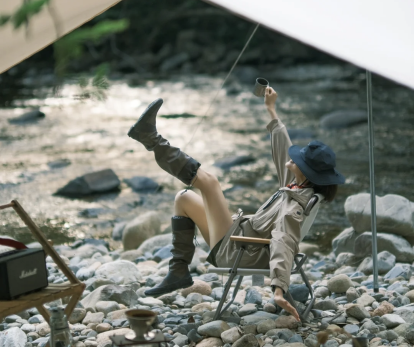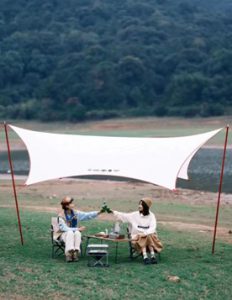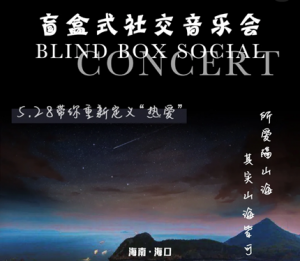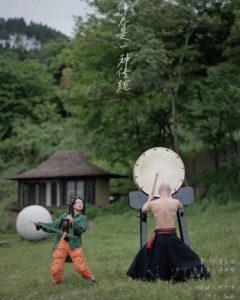

By Coco Wu
Over the last three years, glamping has become one of the hottest buzzwords in China. In the West, glamping normally involves luxurious facilities and high-end hotels. But Chinese glamping often takes place in idyllic suburban campsites with exquisite aesthetics, providing a more accessible version of nature for people to escape urban stress and connect with the natural world.
To understand why glamping has become so popular, it’s important to acknowledge the fundamental relationship between nature and people in China. Rooted in Daoism, people believe that nature is a venerable force that we should respect for its intrinsic power and intelligence – we can see this in Traditional Chinese Medicine, the core philosophy of which is to honour the natural flow and balance of nature. Therefore, people perceive nature as something to enjoy, but not challenge. A place for visiting rather than altering.

Photo source: @小莓亚子 from RED
However, after a rush of popularity, the glamping scene is changing, the hype is waning. At the beginning of 2023, China abruptly ended the “dynamic zero covid” policy and the number of people traveling abroad, especially to popular international destinations like Singapore and Thailand, has surged:
“This Spring Festival, all of my friends were traveling abroad, literally everyone. And I will take a world-round trip soon as well. People are taking the opportunity to travel as much as they can. It’s a mentality thing, like they just want to get out of the country, not because there’s anything wrong with our beloved country, but people are just so desperate to travel.” – a leading-edge consumer told Space Doctors during an interview.
The opportunities to travel further, go out more frequently and freely in the upcoming spring and summer is altering our relationship with nature once again – from a peaceful refuge, to a place in which we can play out a newfound sense of freedom. People are proactively looking for ways to release their built up energy and anticipation, let go in real life, embrace freedom, and, crucially, explore the unexpected in the outdoors.
We see the IRL-shaped hole left by long and unpredictable lockdowns being filled by experiences in natural environments, in places where people can experience the world with few distractions. Where they can connect to what feels ‘real’. Instead of online forums, we see a growth in anonymous socializing activities where people seek more genuine connections by convening with strangers in nature, liberated from social media anxiety and the confines of online rituals.

Photo source: @野栖户外-带鱼 from RED

Photo source: @野栖户外-带鱼 from RED
户外社交盲盒: Outdoor blind box events bypass the matching algorithms and shortcuts of connecting online, to create both spontaneous and more meaningful connections with like-minded people in nature.
A period of hyper focus on health has led to particularly high awareness of radical wellbeing; people are no long satisfied with passive moments of just rest and relaxation. Catalysed by the ‘996’ (working 9am – 9pm, six days a week) toxic rat race, people who feel overwhelmed in urban areas and are looking to nature to truly be themselves, offering a perfect space for the creativity that their productivity-focussed urban lives lack, where people can experiment with different art forms and freely express themselves.

Photo source: @小绿球大地艺术营地 from RED
A luxury hotel from Chengdu organized a traditional concert in a remote farm, inviting musicians to come and freely improvise.
As the glamping craze slows down, it has left a lasting influence on China’s future of social connection and creativity. Brands looking to connect better with the ever-changing outdoor landscape should take note of these implications:
main image credit: @小莓亚子 from RED